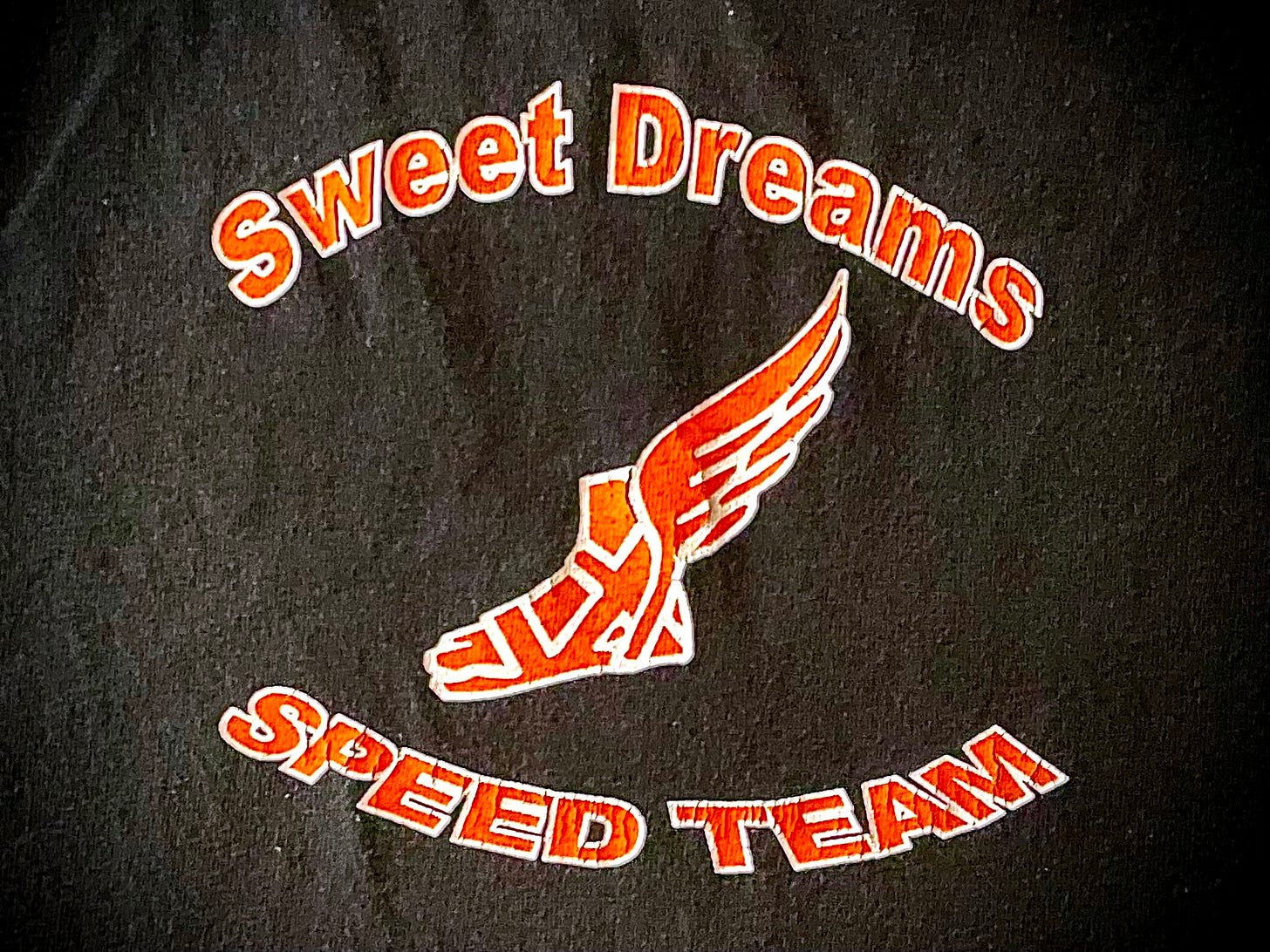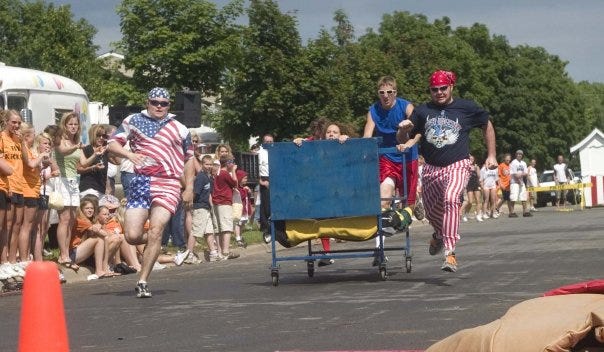Sweet Dreams Speed Team
Community and competition at the annual hometown festival.
Mr. Anderson opened the door and scowled.
“Why are you at my house?” he asked.
He was a teacher and coach in Farmington. I’d never had him in class, but knew him through my dad. They were both golfers, and I was involved in enough school sports and activities that we crossed paths pretty often.
But this was the first time I’d ever been at his house.
“Is Polly home?” I replied.
“Why do you want to talk to my daughter?” he asked.
Ah.
I was 16, Polly had just graduated. I thought she was one of the prettiest girls in school. We’d traded maybe a dozen words ever.
When you grow up in a small town and interact with people for long enough, even in passing, it’s natural to assume that you know them and they know you. And to some degree, that’s true. But standing on the front walk with Mr. Anderson looming over me from the step above, it was suddenly clear that we were only acquaintances.
If Mr. Anderson had known me better, he would’ve realized there was no way I’d make a cold ask for a date. The prospect was terrifying.
Nope. She was one of the best sprinters and hurdlers on the high school track team. My reasons for knocking were competitive, not romantic.
“I’m putting together a bed race team for Dew Days,” I said.
He rolled his eyes and smirked.
“Of course you are,” he said.
By the time I left, Polly had agreed to participate.
The Sweet Dreams Speed Team was off and running.
My hometown of Farmington, Minnesota used to drink the most Mountain Dew per capita in the United States—so I come by my love for it naturally. In 1979, PepsiCo stepped in to sponsor an annual community festival.
Over the years it’s been called Mountain Dew Days, then Founders’ Days, then Dew Days, then Rambling River Days, then Dew Days again, and now it’s been rescued by another company that puts Farmington in distinguished Midwestern territory. As of 2025, the new name for the community celebration is “Top the Tater Days”—after the cult-favorite regional dip that’s made at the Kemp’s dairy plant in town.
Mountain Dew and Top the Tater. Can you think of two better distinctions for a small town?
There’s nothing unusual about the annual town festival. Food vendors, rides, a kiddie parade, and vendors from local business and community organizations fill the streets of town.
My dad’s team won the bed race championship in 1988, a month and a half before I was born.
What is a bed race, you ask?
It’s a bed on wheels. Four people race it down the street with one rider on the bed. At the end of the course, the team has to stop the bed and complete a task of some sort, then race back to the other end with four new runners. The first team across the original starting line is the winner.
That first year, Dahlke and I cobbled together a team and ordered some cut-off muscle shirts with a hastily-designed logo. If I recall correctly, we managed to knock off the highly vaunted team from Pellicci Hardware that seemed to win every year, but fell to the fire department. Oh well.
A few summers later, we decided to give it another go. We decided to keep the team name and dress in patriotic garb. Dahlke and I got serious about our game plan.
“There’s nothing in the rules that says you have to touch the bed,” I said. “All it says is four runners and one rider.”
Dahlke and I usually pushed the bed from behind, using our stocky sprinters’ builds to accelerate from the starting line standstill.
“Ah,” he said. “Like running through first base.”
“And then into a wall,” I continued.
“Only if the rider is cool with it,” he said.
I nodded.
After a team meeting, we decided to go for it. Two smaller guys started at the back of the bed and pushed as Dahlke and I pulled. Once we got to cruising speed, he and I had just enough left in our legs to get a few strides ahead of the bed. As soon as we crossed the turnaround line, we stopped, pivoted, and braced.
The bed’s plywood “headboard” crashed into our shoulders. Our running teammates let go and sprinted past us, ready to begin the task. The rider jumped out of the bed.
Somehow, Dahlke and I weren’t injured. Isn’t it great to be 19 years old? Looking back, I don’t remember signing a waiver.
The maneuver bought us a few extra seconds. Next, our task. Our runner had to put on a sumo wrestler suit, then get through several hula hoops. Our job was to help.
We won the first heat. I was feeling good about our prospects.
After watching a couple more teams, it was our turn again. If we won this race, we’d advance to the championship.
We raced down, survived the crash at the turnaround, and completed our task. Our four new runners took off with the bed. We were neck and neck with the other team when disaster struck.
A reporter for the local newspaper was taking pictures. I didn’t see what happened, but she somehow stepped in front of our bed and got clipped by the speeding frame. Thankfully, nobody was hurt. Unfortunately, our bed got thrown off course and we lost the race.
I tried to appeal. The race coordinator was sympathetic but couldn’t figure out how to remedy the situation. I offered several reasonable suggestions to no avail.
The week after, I sent an email with a few recommendations. Apparently bed races were very important to me at the time, though I’ve never done it since.
It was 2008, the great recession, around the time my mom sold the flower shop and my dad left his longtime company and picked up work delivering anhydrous ammonia tanks to farmers while he looked for another design job. It seemed like we weathered it okay, but maybe I just wasn’t paying attention. Ah, the ignorance and arrogance of youth.
Anyway, that email turned out to be a bad idea. Dahlke and I got volunteered to organize the bed races the next year. Another perk of living in a small town: plenty of opportunities to serve your community. Sometimes whether you want to or not.
This summer, I was able to get back to my old hometown to check out Top the Tater Days with my parents. I was glad to see that Farmington’s bed-racing tradition continues. The championship team took home $300. The best dressed team and the best team spirit awards earned an even better prize—a one-year supply of Top the Tater.
In Nova Scotia, I’ll have the Pictou Lobster Carnival to fill my annual celebration needs. The activities are a little different—boat races and lobster banding contests—but the idea is the same:
Community and competition. Two of my favorite things.





